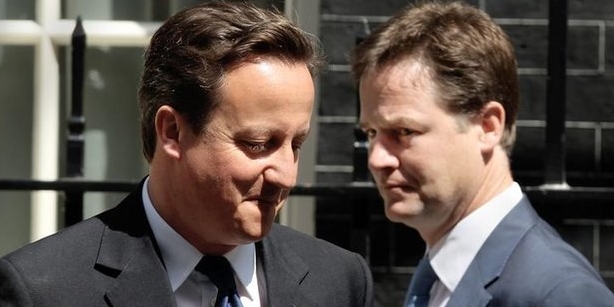 Throughout the short campaign, this blog will be publishing a series of posts that focus on each of the electoral regions in the UK. In this post, Matthew Whiting discusses the key things to look out for in Northern Ireland.
Throughout the short campaign, this blog will be publishing a series of posts that focus on each of the electoral regions in the UK. In this post, Matthew Whiting discusses the key things to look out for in Northern Ireland.
The main issue to the fore in Northern Irish politics in the run up to the general election is pretty much the same as that in the rest of the UK – austerity. In this sense, Northern Ireland today seems less like ‘a place apart’ than it has typically been viewed by Westminster in the past. Yet even the politics of austerity play out within the particular context of its difficult and divided politics and the main parties’ positions are the products of their nationalist or unionist goals. Despite this, the Democratic Unionist Party (DUP) may be an appealing partner for the Westminster parties and come at relatively low electoral cost compared to the other options available.
Sinn Féin are currently resisting demands for greater austerity while the DUP appear somewhat more sympathetic to Westminster demands to shrink the over-sized role of the state in Northern Ireland and bring it more in line with the rest of the UK, especially following the flagship coalition policy of the 2012 Welfare Reform Act. Sinn Féin’s recent hardline rhetoric against welfare cut-backs, however, is a product of its unique electoral concerns as a party seeking to take Northern Ireland out of the UK in the long-term.
The Stormont House Agreement was struck in December between the main Northern Irish parties (including Sinn Féin) and the British and Irish governments, and agreed to a reduction in public expenditure in Northern Ireland (with some important exceptions, such as an initial exemption from the bedroom tax) in return for the devolution of corporation tax. Yet Sinn Féin later reneged on this Agreement, raising tensions with the DUP. This move was in large part because of its electoral interests in the Republic of Ireland. The party is currently the most popular party in the Republic, thanks to its powerful anti-austerity and anti-establishment positions. But supporting welfare cuts and a reduction in corporation tax in Northern Ireland, while simultaneously calling for an end to austerity and greater protection for economically vulnerable groups in the Republic, created an unsustainable contradiction for the party.
Having a coherent set of policies across the Republic and Northern Ireland is especially important for Sinn Féin given that their ambition is to create what they refer to as ‘an all-Ireland dynamic’ towards reunification. As such, they place huge importance on being the main party to compete across the whole island of Ireland and what they do in one jurisdiction has to be seen in terms of its impact on the other. Should the DUP find themselves in the position of buttressing a Westminster government that was overseeing increased austerity, Sinn Féin will almost certainly make their life very difficult in Stormont and use this to try to discredit both British and Unionist politics.
The DUP meanwhile senses an opportunity to integrate the politics of Northern Ireland more closely with that of Westminster. The DUP has expressed delight at the opportunity that the upcoming election may offer them to undertake a confidence and supply agreement with a minority government (they have ruled out a formal coalition). They have scrupulously positioned themselves as a party that could do business with either the Conservatives or Labour, and although their stance on issues such as opposing gay marriage may be awkward to accept for Westminster parties, the durability of the Conservative-Liberal Democrat coalition shows us that governing partners do not need to agree on absolutely everything to still be able to pass significant pieces of legislation.
While the leader of the DUP at Westminster, Nigel Dodds, stated he would look for guarantees around levels of defence spending, an end to the bedroom tax, and greater restrictions on immigration and migrants’ access to welfare in return for his support, he was less clear on what he would seek for Northern Ireland. They will also certainly look for additional funding. But perhaps the greatest gain for the DUP would be to become central to Westminster politics (while still protecting the reserved powers of the Assembly) and thus bring the position of Northern Ireland within the Union more to the fore – surely a big victory in and of itself for all of unionism and not one that will be accepted complacently by the nationalist parties.
The DUP hopes to maximise its potential role in sustaining a Westminster government by increasing its seat share from eight to nine seats. This may be possible due to another distinct feature of Northern Irish politics compared to the rest of the UK, namely the use of electoral pacts. In four key constituencies (Belfast East; Belfast North; Fermanagh and South Tyrone; Newry and Armagh), the DUP and the Ulster Unionist Party have agreed to field a single candidate to avoid splitting the unionist vote. It is certainly not a guarantee that these pacts will result in the total Unionist vote going to a single candidate. Moderate unionist voters sympathetic to the UUP may defect to other centrist Alliance Party if the DUP candidate is seen as too hardline, while hardline unionist voters may be tempted to defect to a more radical Unionist party if the unity candidate is seen as too compromising. Nonetheless, polling data indicates that the DUP should be able to win Belfast East back from the Alliance Party to return a total of 9 seats.
How vital these eight or nine seats will be is, of course, dependent on developments in the rest of the UK, but it is worth noting that the DUP may be a lot more appealing to Labour or the Conservatives than some of the other minor parties. Historically, the parties at Westminster have either not needed, or been reluctant, to rely on the parties of Northern Ireland to maintain a government. However, in 2015 the options Labour and the Conservatives face are limited and come with possible high electoral costs. On the one side is a deal with the SNP – a party that wishes to leave the Union and would potentially harm Labour’s vote share permanently if seen to become a major Westminster player. On the other side is UKIP – a party that is pulling the Conservative’s policy agenda away from its traditional strength of focusing on the economy and which poses a threat to the vote shares of both Labour and the Conservatives. Under these conditions a deal with the DUP who would not rock-the-Westminster-boat and who poses no threat to their future vote shares, may seem highly inviting if needed come May 8th.
 Matthew Whiting completed his PhD at the LSE where he examined the moderation of Sinn Féin and the IRA. He is currently a Lecturer in British and Comparative Politics at the University of Kent. His research interests are around British party politics, state responses to violent separatism, and constitutional designs to regulate conflict.
Matthew Whiting completed his PhD at the LSE where he examined the moderation of Sinn Féin and the IRA. He is currently a Lecturer in British and Comparative Politics at the University of Kent. His research interests are around British party politics, state responses to violent separatism, and constitutional designs to regulate conflict.







The problem with “austerity” is that it is a very ill-defined word. And a weasel word of Orwellian proportions to boot. Consider a private creditor with,say, 100,000 pounds debt. He/she has not yet repaid any, then comes back for more. His/her bank does not insist in repaying the former credit, instead they … issue 120,000 pounds, so that the former credit can be “repaid” plus 20,000 to “cover current expenses”. Would you agree, that these 20,000 pounds (as well as the original 100,000 by the way) have to come from “somewhere”? Could you, for a moment, imagine, that, wherever they came from, they are now missing from wherever they came from? Maybe, wherever they came from, they were doing “God’s work”, i.e. helped finance a fish-and-chips boutique which now cannot refinance. Or, it does not even need refinancing, as it can cover all its expenses (and more) from its well-earned cash-flow, but now it cannot expand and create jobs etc., because … its bank tells it it (the fish-and-chips parlour) must now steer a policy of austerity? To gibe the moneys to the state because austerity there is oh so bad? Am I making a mistake when I argue the fish-and-chips seller would be my better choice, creditworthy and all, to give that money to after the state for decades has proven it is unable to even “compete” with the lowliest uneducated fry pan handler?